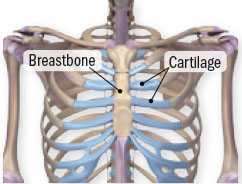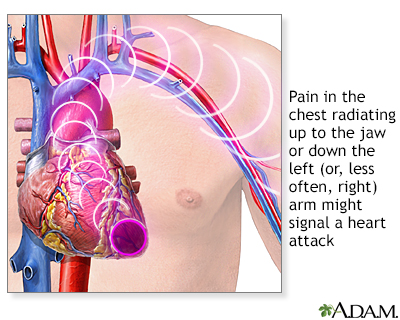
And because chest pain may indeed be a sign of angina or of some other heart problem it is always a good idea to have it checked out. In certain cases the pain travels up the neck into the jaw and then radiates to the back or down one or both arms.

Chest pain that worsens with exertion.
Sore chest pain. Chest pain appears in many forms ranging from a sharp stab to a dull ache. Sometimes chest pain feels crushing or burning. In certain cases the pain travels up the neck into the jaw and then radiates to the back or down one or both arms.
Many different problems can cause chest pain. The most life-threatening causes involve the heart or lungs. Chest pain is always an alarming symptom since it usually makes everyoneboth you and your doctorthink of heart disease.
And because chest pain may indeed be a sign of angina or of some other heart problem it is always a good idea to have it checked out. Chest discomfort thats related to gastroesophageal reflux disease GERD is often called noncardiac chest pain NCCP according to the American College of Gastroenterology ACG. Chest pain that radiates to other parts of your body such as down your arms or up to your jaw.
Chest pain that worsens with exertion. Nausea along with chest pain. The combination of sore throat and chest pain could be a sign of asthma GERD lung cancer or another underlying condition.
The muscular chest pain is a condition where a person should be aware for hisher health state as it is the sign of the heart attack. The muscular chest pain is not always felt as same it is so it is difficult for the person to recognize what sort of pain they are feeling in their chest. Chest pain and heart problems.
The most common heart problems that cause chest pain include. Pericarditis which usually causes a sudden sharp stabbing pain that gets worse when you breathe deeply or lie down. Angina or a heart attack which have similar symptoms but a.
A person should never ignore chest pain. If a person is experiencing chest pain on the left side of their body this could indicate a heart attack or other medical conditions such as a lung. A pneumothorax typically causes sudden sharp stabbing chest pain on one side.
The pain is usually made worse by breathing in and you can become breathless. Usually the larger the pneumothorax the more breathless you become. A tight or burning pain in the middle chest and upper abdomen that occurs while lying down may be a symptom of gastroesophageal reflux disease.